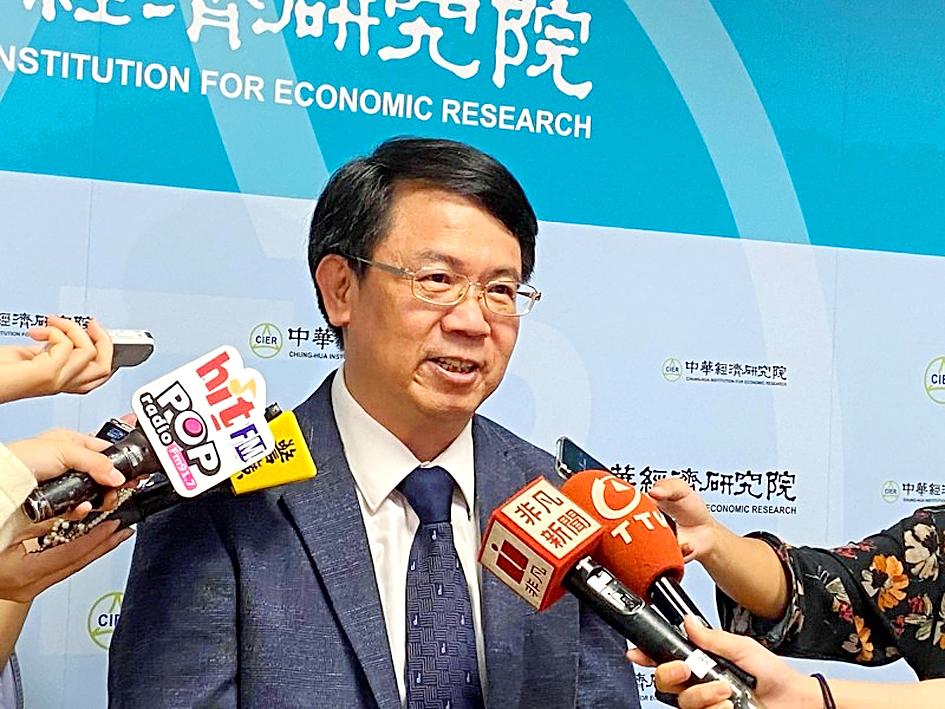The Chung-Hua Institution for Economic Research (CIER, 中華經濟研究院) yesterday raised its forecast for the nation’s GDP growth this year to 1.76 percent, from its previous estimate of 1.33 percent, saying exports and private consumption have staged a V-shaped recovery from the COVID-19 pandemic in the second half of the year.
“The upgrade aims to reflect the fast recovery in Taiwan’s exports and domestic demand,” CIER president Chang Chuang-chang (張傳章) told a media briefing.
The Taipei-based think tank said the economy might have expanded 2.77 percent last quarter — emerging from a 0.78 percent decline in the second quarter — and would grow 2.55 percent this quarter.

Photo: Wu Chia-ying, Taipei Times
The showing is impressive, making Taiwan one of the few economies reporting growth as COVID-19 infections surge in many parts of the world, threatening economic activity, the institute said.
Local technology firms have benefited from strong demand for 5G deployment and electronic devices required for a low-contact economy as well as rush orders and order transfers amid US-China tensions, CIER said.
China’s Huawei Technologies Co (華為) avidly stockpiled electronics inventory ahead of the Sept. 15 sales ban imposed by Washington due to national security concerns.
Outbound shipments might have increased 3.86 percent last quarter and would likely gain 2.59 percent in the current quarter from their year-ago levels, CIER said.
Imports would be soft for the whole of this year, due to lower fuel and raw material prices, allowing net external demand to contribute 0.82 percentage points to GDP growth this year, it said.
Domestically, private investment is likely to rise 2.55 percent from last year, aided by companies returning from China, and efforts by local tech firms to expand and maintain technology leadership, CIER said.
The government and public enterprises would lend support by raising their investments by 10.88 percent and 26.39 percent year-on-year respectively, it said.
Active investments would offset weak private consumption, a key GDP component that would stay in negative territory this year, despite a rapid recovery from the third quarter onward, it said.
CIER expects the New Taiwan dollar to trade at an average of NT$29.76 against the US dollar for the year, compared with yesterday’s closing rate of NT$28.932.
Central bank Governor Yang Chin-long (楊金龍) last week told lawmakers that the NT dollar would likely trade above NT$29 per US dollar in the coming six to 12 months, bolstered mainly by strong exports.
CIER forecast the unemployment rate to hover at about 3.99 percent and consumer prices to contract 0.2 percent this year, with the virus infections, US elections and other geopolitical risks creating uncertainty.

In Italy’s storied gold-making hubs, jewelers are reworking their designs to trim gold content as they race to blunt the effect of record prices and appeal to shoppers watching their budgets. Gold prices hit a record high on Thursday, surging near US$5,600 an ounce, more than double a year ago as geopolitical concerns and jitters over trade pushed investors toward the safe-haven asset. The rally is putting undue pressure on small artisans as they face mounting demands from customers, including international brands, to produce cheaper items, from signature pieces to wedding rings, according to interviews with four independent jewelers in Italy’s main

Japanese Prime Minister Sanae Takaichi has talked up the benefits of a weaker yen in a campaign speech, adopting a tone at odds with her finance ministry, which has refused to rule out any options to counter excessive foreign exchange volatility. Takaichi later softened her stance, saying she did not have a preference for the yen’s direction. “People say the weak yen is bad right now, but for export industries, it’s a major opportunity,” Takaichi said on Saturday at a rally for Liberal Democratic Party candidate Daishiro Yamagiwa in Kanagawa Prefecture ahead of a snap election on Sunday. “Whether it’s selling food or

CONCERNS: Tech companies investing in AI businesses that purchase their products have raised questions among investors that they are artificially propping up demand Nvidia Corp chief executive officer Jensen Huang (黃仁勳) on Saturday said that the company would be participating in OpenAI’s latest funding round, describing it as potentially “the largest investment we’ve ever made.” “We will invest a great deal of money,” Huang told reporters while visiting Taipei. “I believe in OpenAI. The work that they do is incredible. They’re one of the most consequential companies of our time.” Huang did not say exactly how much Nvidia might contribute, but described the investment as “huge.” “Let Sam announce how much he’s going to raise — it’s for him to decide,” Huang said, referring to OpenAI

The global server market is expected to grow 12.8 percent annually this year, with artificial intelligence (AI) servers projected to account for 16.5 percent, driven by continued investment in AI infrastructure by major cloud service providers (CSPs), market researcher TrendForce Corp (集邦科技) said yesterday. Global AI server shipments this year are expected to increase 28 percent year-on-year to more than 2.7 million units, driven by sustained demand from CSPs and government sovereign cloud projects, TrendForce analyst Frank Kung (龔明德) told the Taipei Times. Demand for GPU-based AI servers, including Nvidia Corp’s GB and Vera Rubin rack systems, is expected to remain high,